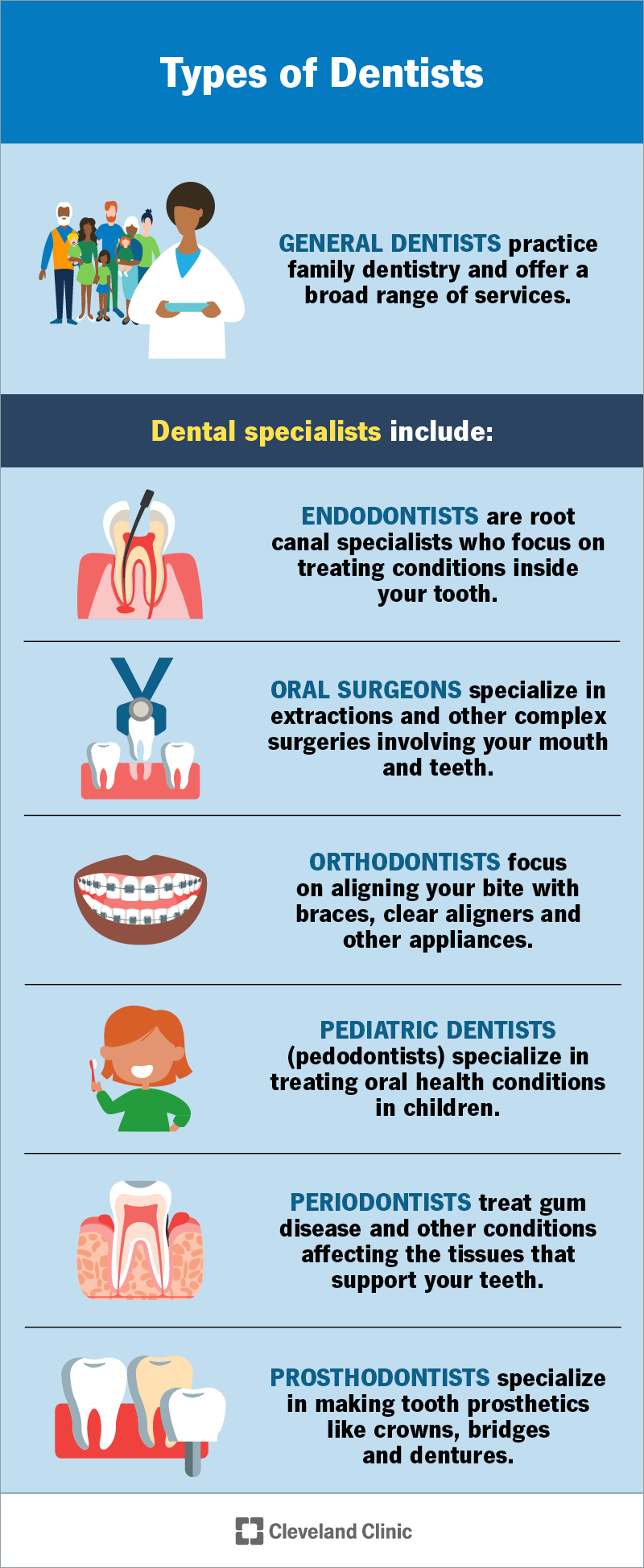A dentist is a doctor who diagnoses and treats oral health conditions. Just as you visit your physician for regular checkups, you should see your dentist at least twice a year for exams and cleanings. Routine dental care reduces your risk for oral health issues and improves your overall well-being.
Advertisement
Cleveland Clinic is a non-profit academic medical center. Advertising on our site helps support our mission. We do not endorse non-Cleveland Clinic products or services. Policy

Image content: This image is available to view online.
View image online (https://my.clevelandclinic.org/-/scassets/Images/org/health/articles/dentist-infographic)
Dentists are healthcare providers who diagnose and treat oral health conditions. They help keep your teeth and gums in tip-top shape. Like physicians, dentists are doctors who help support your overall health.
Advertisement
Cleveland Clinic is a non-profit academic medical center. Advertising on our site helps support our mission. We do not endorse non-Cleveland Clinic products or services. Policy
A dentist can do a wide variety of procedures, including:
Dentists can also prescribe medications when necessary. These can include:
General dentists often practice family dentistry. They offer a broad range of services, from sealants and teeth whitening to fillings and dental implants. General dentists are probably who you imagine when you think about visiting the dental office.
But there are dental specialists, too, including:
Advertisement
There are other dental specialties, too. For example:
The American Dental Association (ADA) recommends visiting your dentist regularly for exams and cleanings. Twice a year works for many people, but you might need more frequent visits if you’re prone to cavities or gum disease.
Visiting your dentist regularly helps detect oral health issues before they worsen — saving you time, worry and money in the long run.
You should also schedule an appointment with your dentist if you develop:
Fear of dentists is common. Maybe you even avoid necessary dental care due to anxiety. If you’re nervous about visiting the dentist, tell your provider. Many dentists offer sedation options to keep you comfortable during procedures.
If you live in the U.S., you may see one of two titles following a dentist’s name:
If you see either of these titles, it means that your dentist graduated from an accredited dental school. A DDS and DMD receive the same amount of training and can do the same dental procedures.
In the U.S., general dentists usually go to school for eight years. This includes four years for undergraduate studies and four years to complete dental school. Dental specialists go to school for 10 to 11 years. This includes four years for undergraduate studies, four years to complete dental school, plus two to three years to complete a residency program.
Board certification by organizations like the American Board of General Dentistry and the Academy of General Dentistry means that a dentist commits themselves to excellence in their field. Following graduation from dental school or residency, a dentist who wishes to become certified must pass rigorous testing that includes written, oral and clinical exams.
Healthcare providers have long recognized the connection between oral health and whole-body health. If you have an infection in your mouth, then it’s in the rest of your body, too. In addition to protecting yourself against cavities and gum disease, visiting your dentist regularly gives you the best chance to live a long and healthy life.
Advertisement
Advertisement

Sign up for our Health Essentials emails for expert guidance on nutrition, fitness, sleep, skin care and more.
Learn more about the Health Library and our editorial process.
Cleveland Clinic’s health articles are based on evidence-backed information and review by medical professionals to ensure accuracy, reliability and up-to-date clinical standards.
Cleveland Clinic’s health articles are based on evidence-backed information and review by medical professionals to ensure accuracy, reliability and up-to-date clinical standards.
Dentistry plays an important role in oral health. Cleveland Clinic’s experts can design a personalized plan that will keep you smiling for the long haul.
